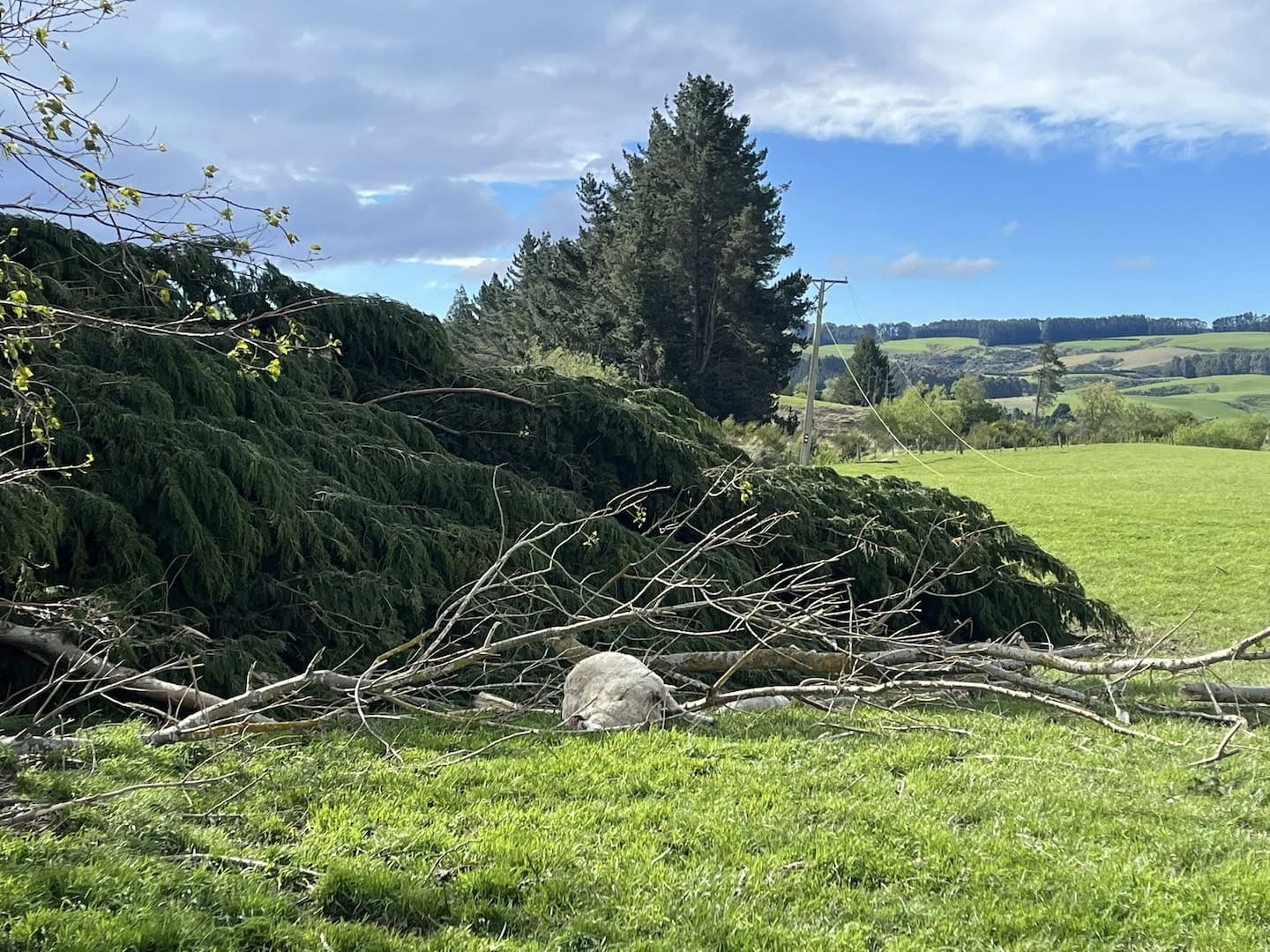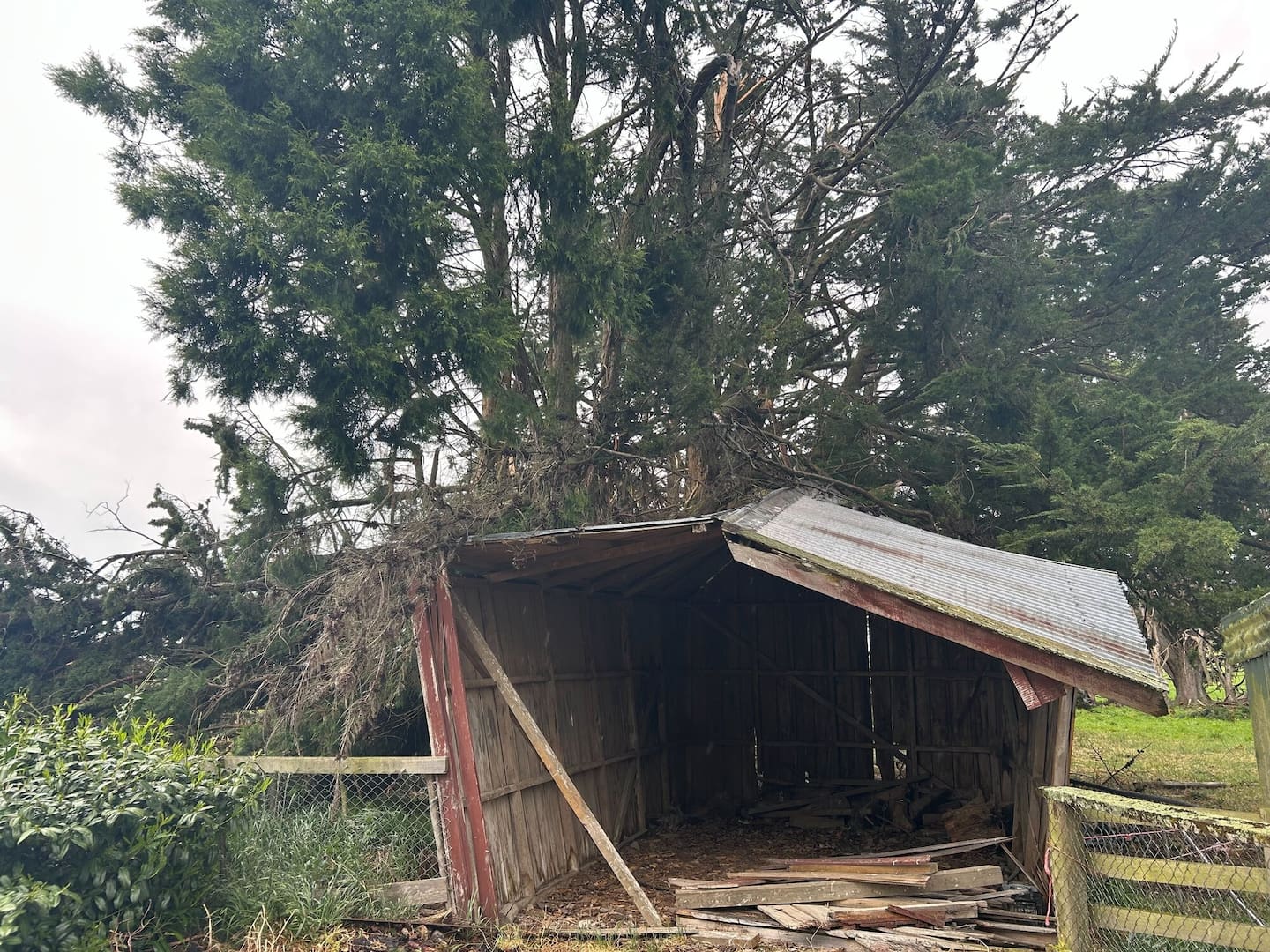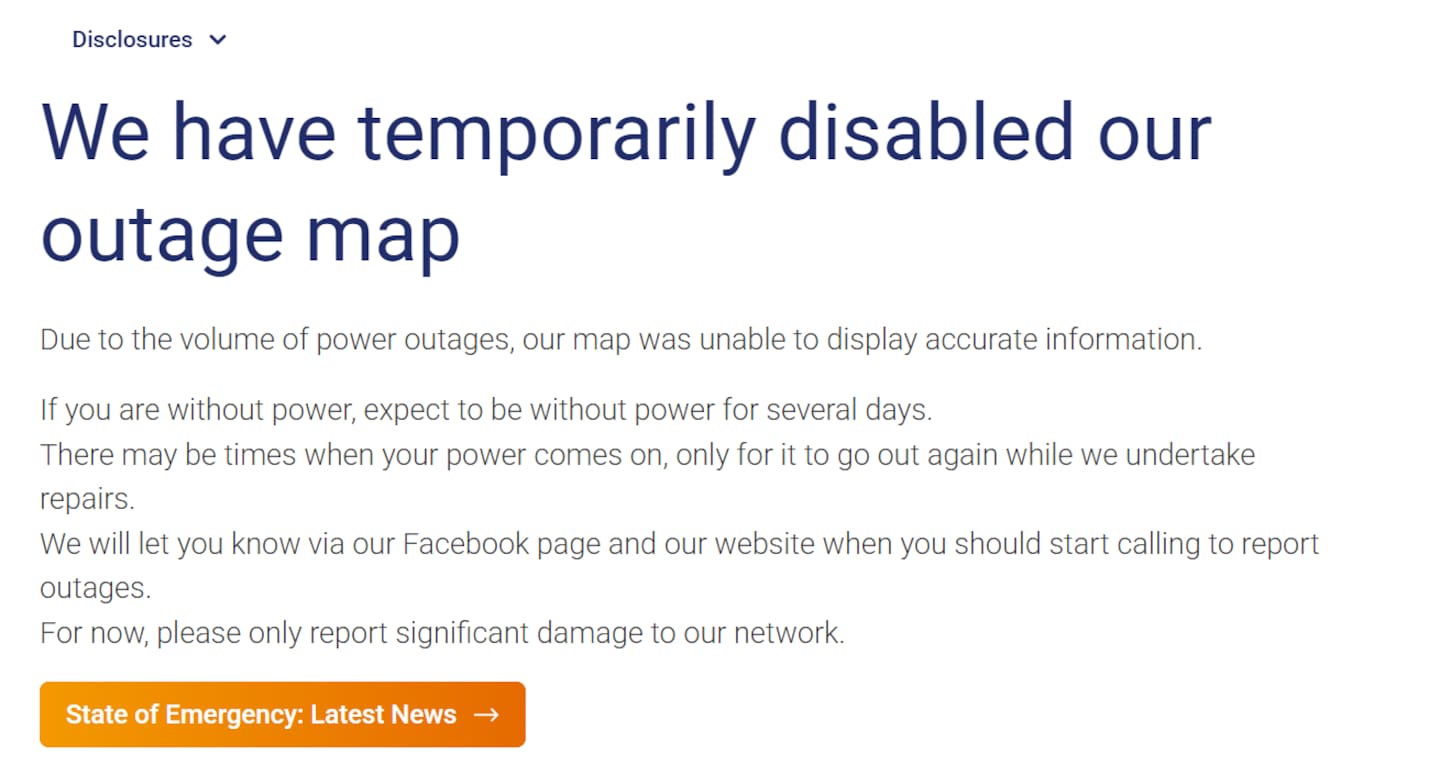Communities across Southland and Otago have banded together after a week of wild weather left thousands without power for days, flattened trees, and even brought late-year snow.
Parts of Southland and Otago remain in states of emergency, with communities still grappling with the aftermath of more than a week of severe weather.
Emergency Management Southland reports 6250 customers in the region, and 2500 in Otago, remain without power, with crews working to reconnect properties while a âlong tailâ of outages could last up to a week for some households.

Heriot farmer Graeme Richardson says one of his ewes was electrocuted when a tree she was sheltering under fell, bringing down powerlines. Photo / Alan Richardson
A co-ordinated response is currently under way, with 31 generators circulating across the region to support dairy sheds, community hubs, and essential infrastructure, and five NZ Defence Force soldiers deployed to conduct welfare checks and deliver information to remote communities.
On Monday, the Minister for Emergency Management and Recovery, mark Mitchell, announced a contribution of $150,000 to the Southland and Clutha Mayoral Relief Funds to assist with the recovery.
Provider PowerNet has warned residents that the scale of the stormâs damage was unprecedented, and that the company was currently unable to provide estimates for when electricity will be restored to every property.
Waikaka Station farmer Sharon Patterson said her property had been without electricity for nearly six days after gale-force winds tore through the region on Thursday.
âItâs just amazing how itâs come through right across Southland.â
She and her family have been running three generators to keep their farm and home going, as well as sharing resources with neighbours.

On the sixth day without power, snow settles on the hills surrounding Waikaka Station station. Photo / Sharon Patterson
âWe had the neighbours showering last night and we were filling water for the other neighbours the day before,â Patterson said.
âYou just share it all around, you just get on with it.â
Patterson and her husband had 75 orphaned lambs that rely on electric milk feeders, but the outage forced some quick improvisation.
âWe had to plug our two generators together to heat the milk,â she said.
âIn the end we made the call, âLambs, youâre now on cold milk,â and they adapted quite easily. That freed up a generator we could move between our house and our sonâs.â

High winds caused havoc across the South Island on Thursday. Photo / Mike Thorpe
She said the stormâs power exposed the vulnerability of the electrical grid.
âThe most important thing this has taught us ... is that we must continue to have fossil fuels, whether we like it or not,â she said.
âWithout my gas cooker this morning, we couldnât have had girdle scones for my tea.â
Patterson praised lineworkers for their tireless efforts despite the uncertainty of when they would be reconnected.

PowerNet's outage map was disabled due to the sheer volume of outages across the regions. Image / Supplied
âGetting your power back on is a bit like winning Lotto. When your numbers come up, they come up.â
Further north in Heriot, Avalon Genetics farmer Alan Richardson said the same storm narrowly missed claiming lives.
âMy wife went through a gateway checking sheep, and half an hour later a five-tonne tree came down over it,â he said.
âThankfully, there was no human loss of life, but there were some stock losses. One of my ewes got electrocuted after the lines came down, just in the wrong place at the wrong time.â

Alan Richardson says it was lucky no humans were killed during the high winds. Photo / Alan Richardson
Richardson said about 30 large trees fell across fence lines on his property, and power wasnât restored for five days.
âThe trees are that big you canât go near them with a chainsaw, itâs too dangerous,â he said.
âWeâve got to wait for diggers to take the weight off before we can move them.â
He said while the clean-up was huge, the community response has been humbling.
âItâs really amazing how everyone works together,â Richardson said.
âThatâs what gets people through, the community spirit is alive and well.â
Te Anau pharmacist George Batchelor said the town fared comparatively well but still faced logistical challenges after the power cut.

The scale of the damage across Southland and Otago is still being assessed. Photo / Supplied
âOur experience was almost purely related to the outage - no infrastructure damage at all,â he said.
âWe had a generator and emergency plan ready from after Cyclone Gabrielle, so within 45 minutes of the power going out we had everything running.â
Batchelor said the pharmacy maintained fridge temperatures for medications and later set up a Wi-Fi hub for residents when mobile networks went down.
âI was late to think of it, unfortunately, but we were able to provide fibre connection and run guest Wi-Fi so people could communicate,â he said.
âThatâll go in the next plan.â
He said the townâs calm response made a big difference.
âThe people of the town were great, no panicky chaos, no overloading the system,â he said.
âItâs a good opportunity now to evaluate what we did well and where the gaps are.â
Batchelor urged residents to keep a two-week buffer of essential medicines at home in case of future emergencies.

Severe winds tore the roof off the Tapanui Four Square. Photo / Supplied
âThe restaurants and supermarkets did an amazing job feeding people who couldnât get fuel to leave. They really stopped it from being a calamity.â
A West Otago dairy farmer, who asked not to be named, said he used his generator to help a neighbour who hadnât been able to milk for three days.
âThere were macrocarpa trees across the lanes and sheds blown out, theyâd lost water and the cows hadnât been milked for days.
âI bought that generator after helping out with Cyclone Gabrielle - it sat in the shed for two years, but itâs been a godsend now.â
Two large trees were blown down outside the Hocken Library in Dunedin, complete with a road sign. Photo / Ben Tomsett
Tapanui resident Graeme Edgar said the storm was the most severe he had seen in nearly five decades, with some properties without power for up to four days.
The townâs Four Square supermarket had its roof ripped off but was reopened by 2pm the next day.
âWe get easterly storms here and storms from the south âĶ this one was just a freak," he said.
He also commended the efforts of PowerNet lineworkers: âTheyâve got an awful lot to do. The phones are probably screaming, and theyâre just getting on with it.â
As Richardson put it: âWeâve had tough times before. We choose this life, and we get through it together. Seeing a bit of blue sky today, that helps too.â
Ben Tomsett is a multimedia journalist based in Dunedin. He joined the Herald in 2023.
Take your Radio, Podcasts and Music with you
Get the iHeart App
Get more of the radio, music and podcasts you love with the FREE iHeart app. Scan the QR code to download now.
Download from the app stores
Stream unlimited music, thousands of radio stations and podcasts all in one app. iHeart is easy to use and all FREE









